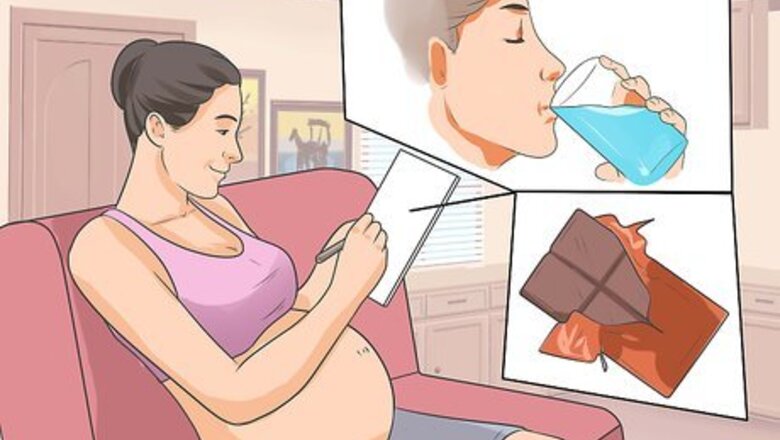
views
Changing Your Diet
Consider eating smaller, more frequent meals. Large meals can make you burp more and feel even more bloated. Instead of eating standard three meals a day as you normally would, consider eating six small, evenly-spaced meals. Aside from minimizing excessive burping, a switch to six small meals may also help you cope with morning sickness. Many women find that having a little bit of food in their stomachs at all times reduces their nausea. Avoid eating within three hours of bedtime. Allow yourself time for digestion, even of a smaller meal.

Notice what triggers burping. Your body's hormones will change during pregnancy. Your reaction to foods will be different. A food journal is one way to learn more about your body's response to particular foods. If you notice that eating certain foods is followed by burping, see if avoiding these foods results in less burping. Common triggers for burping during pregnancy are fruit juices, chocolate, or rich foods. Drinking a glass of milk may help relieve gas, particularly when accompanied by heartburn.

Aim for balanced meals. Try to make each small meal include a lean protein, a complex or starchy carbohydrate, and a fruit and/or vegetable. In particular, lean proteins are a great way to add nutrients and cause very little gas. Small balanced meals will give you the vitamins, minerals, protein, antioxidants, fiber, and other nutrients that you need. Eating too much at one time, or too quickly, will often cause burping. Eating slowing, chewing each bite well, will help prevent burping.
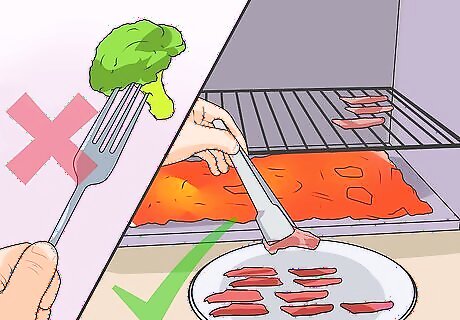
Avoid foods that cause gas. There are some foods that are worse than others when it comes to gas. Some of these include beans, broccoli, cabbage, Brussels sprouts, asparagus, and bran. Try to avoid eating these items if you want to reduce the amount of burping you are doing. You should also stay away from sugar-free products, as they could contain maltitol and sorbitol, both of which have a tendency to cause gas. Fatty, fried foods often trigger burping and heartburn. Choosing grilled, steamed, or baked foods is a better choice.

Drink lots of water. Water helps you digest your food more efficiently and therefore will help you reduce how much you burp. When you become pregnant, your muscles relax more than usual. Muscle relaxation causes your digestion process to slow down and causes gases to build up. Water will help flush your system and reduce the gases stuck in your digestive tract. Aim to drink 64 ounces (or more) of liquid every day, mostly water. Drinking water actually helps to prevent water retention, which is another undesirable effect of pregnancy. Caffeinated teas, coffee, and other beverages should be limited to 200 mg per day. Usually this translates into a 12-ounce cup. Water carries nutrients to your baby too, and will prevent dehydration. If you don't like the taste of water, try adding a wedge of lemon or lime, or a sprig of fresh mint.
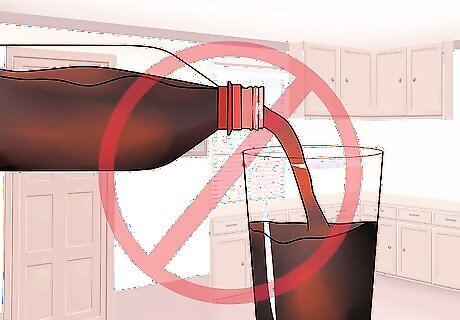
Cut down on carbonated beverages. Sodas and other carbonated drinks contain compressed gases that encourage burping. Avoid them if you want to stop burping so often. Be aware that many sodas contain high caloric content as well as caffeine. If you choose to drink soda during pregnancy, drink it sparingly. Diet sodas should be avoided altogether during pregnancy. Research has shown that consuming diet soda may cause preterm delivery.

Try herbal tea. Peppermint is a carminative – an herb or preparation that prevents the formation of gas in the gastrointestinal tract or facilitates its expulsion. Drinking peppermint tea may help reduce burping. Chamomile tea also has a similar effect on the body. There are many other carminatives, and some of them – including cinnamon, garlic, and ginger – are easy to incorporate into your diet. Talk to your doctor, though, before trying other herbal remedies, as they may not all be safe to take during pregnancy.
Reducing the Amount of Air You Swallow

Eat slowly. When you eat too fast, you'll be swallowing air along with your food. This results in burping. Eating quickly may also be a sign of stress, which is connected to increased gas production. Avoid this issue by sitting up straight, eating slowly, and chewing your food thoroughly. You should also avoid talking while you eat because you are unknowingly swallowing more air when you talk and chew. If you think you may have had a meal that might make you burp a lot, go for a stroll after you eat. Walking will help to move the food through your digestive tract and reduce the desire to burp.

Reduce the amount of air you swallow when drinking. Avoid this problem by practicing good posture, sitting up straight when you drink. Drinking directly from a cup or glass will help prevent swallowing air. You should also avoid switching quickly from hot to cold beverages (and vice versa), as sudden changes in stomach temperature can make you swallow more air. Bending over to drink from a water fountain results in swallowing air, leading to burping. Carry a water bottle, and fill it from a water fountain when needed.

Avoid alcohol. Drinking alcoholic beverages increase stomach acidity, leading you to swallow more air. It also increases the chances of certain birth defects. Medical practitioners recommend eliminating alcohol completely, especially during the initial stages of pregnancy. If you feel that eliminating alcohol from your diet will be difficult for you, ask for help. If you don't feel comfortable talking to your medical provider about this issue, there are many anonymous helplines that you can call. Certain studies suggest that very light alcohol use in the latter stages of pregnancy will not result in harm. Light use means one to two alcohol units per week (one to two 5 ounce glasses of wine). More than six units per day can result in Fetal Alcohol Syndrome, a lifelong pervasive developmental disorder.
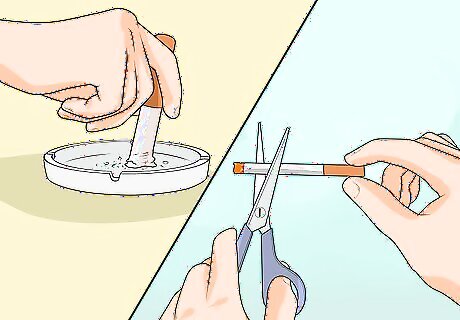
Quit smoking. Smoking causes you to swallow air, which leads to increased gas and burping. In addition, smoking cigarettes is the leading cause of adverse outcomes for babies. Cigarette smoke contains over 4000 chemicals. Many are toxic to you and your baby. As the baby's only source of oxygen is the air you consume, these chemicals have a huge impact on your baby's development. Ask your medical provider for help quitting smoking.
Making Other Lifestyle Changes

Stay calm, and carry on. Tension and anxiety aren’t helpful to you or your baby, and they can increase gas and burping. This is a chance to engage in low-key activities you enjoy. Watching movies with friends, reading a book, or getting a massage can be therapeutic as well as fun. Deep sighs can also cause you to swallow more air than normal, which in turn leads to gas.

Practice mindful meditation. Along with helping you relax, meditation will also help you to breathe more calmly and effectively, thus eliminating any extra air you might be swallowing. Meditation has multiple benefits. It has been shown effective to minimize mood swings, to increase self-awareness, and decrease stress, which has a direct correlation to burping. You can practice mindfulness meditation in almost any setting.
Sign up for a yoga or meditation class specifically designed for pregnant women. Yoga improves breathing, strengthens the abdominal muscles which will help you with excess air, and burping. Yoga has also been connected to better sleep, decreased anxiety, and fewer headaches. Avoid hot yoga, poses that require lying on your belly or back, and any pose that puts pressure on your abdomen.

Exercise regularly. You may feel tired, but regular, mild to moderate exercise plays an important role in the release of hormones, enzymes, digestive juices, and stomach acid. If you exercise regularly, you may reduce excessive burping and promote good circulation, providing better blood supply to your baby. Go on a walk, or do light work in your garden. Even standing to wash dishes following a meal may be helpful in minimizing burping. Talk to your doctor about your exercise plans during pregnancy. Some doctors recommend avoiding strenuous activity. A lot depends on your individual health, so consult your doctor.
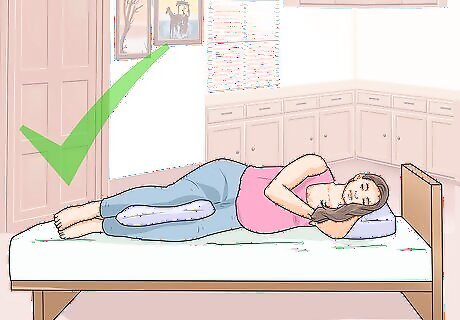
Get enough sleep. Sleep is crucial during pregnancy, and getting a solid eight hours each night can help minimize annoying pregnancy symptoms. When you go to sleep at night, lie on your left side with one or both of your legs tucked up and bent. This position will help your digestive tract to do its job, reducing the amount of gas your body produces at night. Avoid exercise close to bedtime. Practice relaxation techniques to help with insomnia, and reduce stress.

















Comments
0 comment